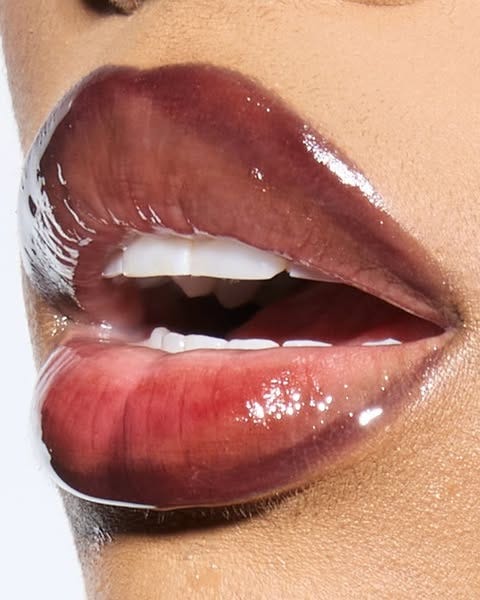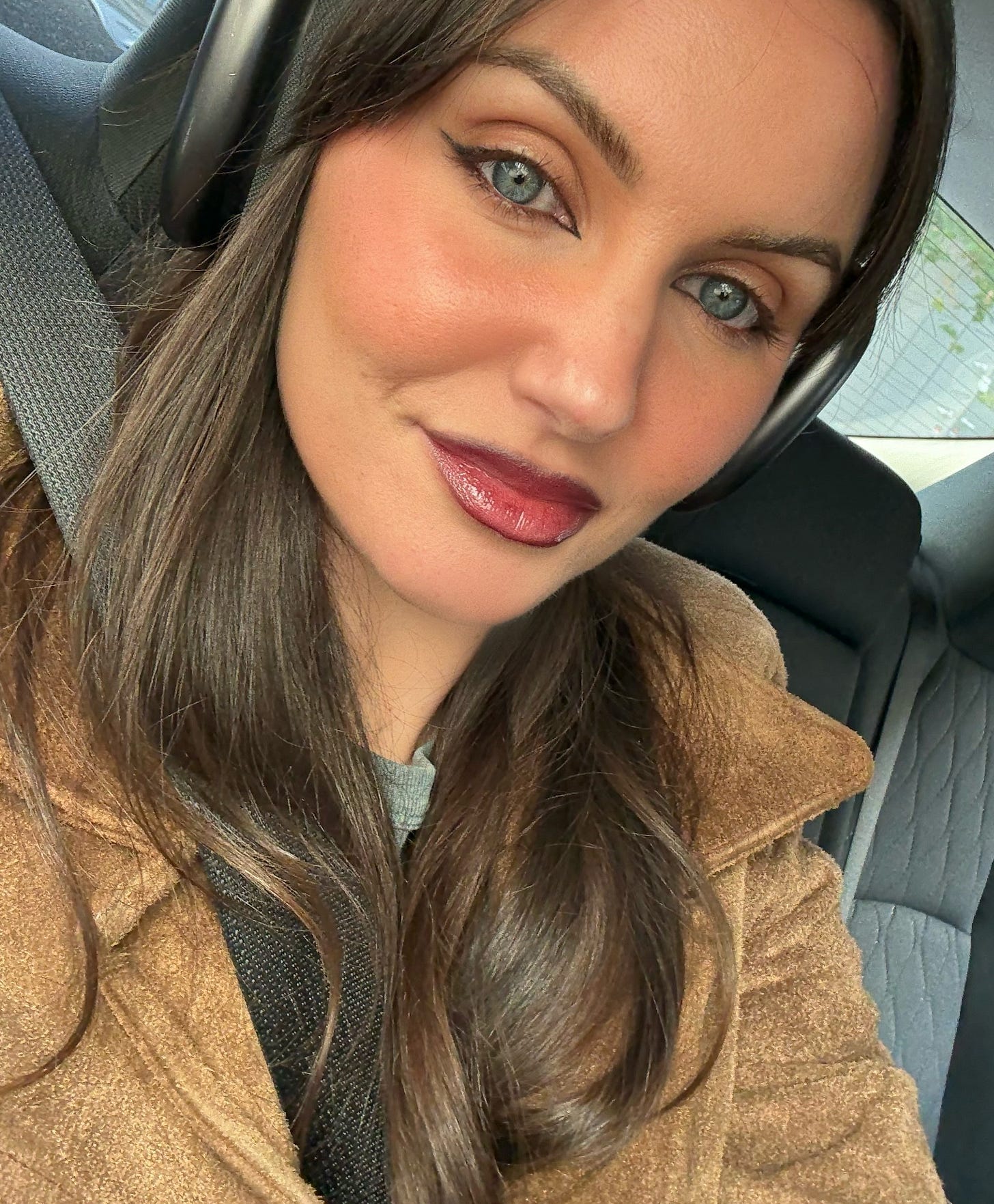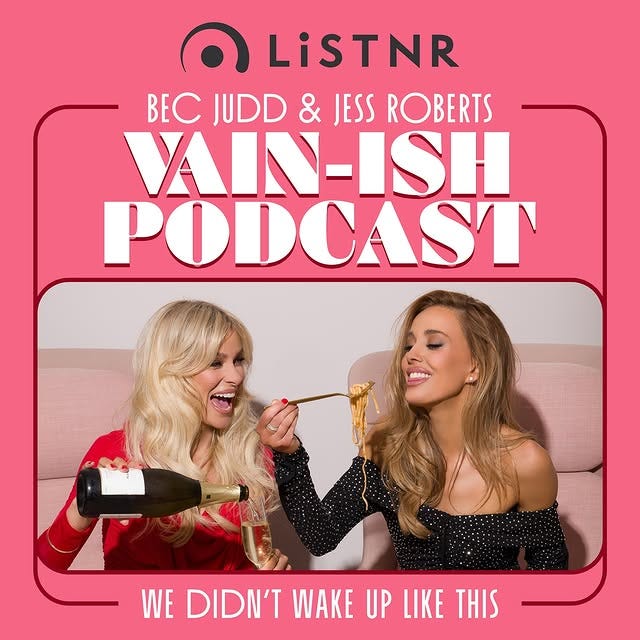I guess I'm defending Bec Judd
Why cosmetic disclosure is a knife, and a review of Huda Beauty's divisive lip stains
There’s a lip stain that’s currently dividing the internet. The new Huda Beauty Lip Contour Stain has gone viral on TikTok, prompting a lot of the shades to sell out at Sephora. The product itself, however, is proving very divisive – some report that it’s the best low-effort lip colour they’ve worn in years, others claim it dries out instantly and is too expensive for only 1ml of product.
It’s a rare product that’s both going viral and getting dragged, but I guess that’s life online in 2025. I’ve been testing the shades Rosewood and Rich Brown for several weeks, and I think I’ve finally given both enough of a run for a proper review.
When I first tried the formula, I was… confused at best. I couldn’t get a single clean swipe across my lip line, as the formula would quickly turn patchy. Annoyed, I tried the other shade and found the same issue. Then I clocked the tiny arrows on the pen, which indicated that it should always be stored cap down.
I placed both in my cupboard, left them for a few hours then came back. My next attempt was slightly better, though I still had trouble getting an even distribution of pigment. By this time I’d seen advice on TikTok that suggested lining the lips in four parts, breaking momentarily in between to blur the edges of each section before the stain could set.
I’ve been doing this ever since and it’s definitely made things a lot easier to line with smooth, confident strokes. The lip stains also feel extremely light and comfortable, and they really do last for many, many hours.
Still, I have to agree with some of the TikTok discourse; the lip contour stains are really pigmented and given that the distribution can be tricky, they tend to require a few layers to ensure that application is even. Much has been made about the fine, flocked tip, however I don’t find it all that easy to manoeuvre and it doesn’t always dispense the pigment consistently.
As I demonstrated in the video below, you might find that you line one side and then line the other, and one ends up with a stronger outline. This means the end result often ends up looking darker than you’d want them to, and you’re also required to spend longer perfecting the finish by going over the area.
The formula is also prone to ‘grabbing’ in any bumps or texture around the lips, so you’re going to want to ensure that you’ve exfoliated the area prior to putting this one on.

 Tiktok failed to load.
Tiktok failed to load.Enable 3rd party cookies or use another browser
That said, I still… like it. Is it my favourite? No. Will I still wear it? Definitely, judging by the last few weeks. Do I agree that 1ml of product seems like a small amount? Also yes. Do I think a product that requires such specific storage conditions kind of undermines the ‘effortless’ aim of a lip stain? Yes to that too. But would I try more shades if given the chance? Ugh, I absolutely would.
My advice? If you are going to buy it, I’d definitely recommend going in store to test the shades and ensure that you’re confident with the applicator. If you’re happy in that regard, and you’re willing to abide by the somewhat limiting storage terms, it’s a lovely lightweight lip stain once you’ve mastered the application. And if you’re not into the Huda Beauty formula – or simply can’t get your hands on the shade you want – let me put you on to a lip stain that’s just as worthy.
The Peppr Sculpt + Stain Lip Marker has a chunkier base and tip, which I actually find much easier to grip and sketch around the lip border. It lasts just as long as the Huda Beauty stain, it doesn’t bleed or smudge, it applies evenly and there are three neutral shades. Oh, and at $34 for 3ml it’s far cheaper and it’s a local Australian small business.
Disclosure is a knife
We’ve entered an era of cosmetic disclosure this year, and model, influencer and businesswoman Rebecca Judd is on board. A week or so ago she launched Vain-ish with friend Jess Roberts, a podcast that aims to “take the shame out of being vain” and “lift the veil” on the products, treatments and procedures that women are getting.
As usual, the Kardashian-Jenners have set the tone. In recent weeks, Kris, Kylie and Khloé each publicly acknowledged having undergone cosmetic procedures, following years of denials or dodging of the topic. These admissions were widely praised as refreshing, with Kylie in particular hailed as a “girls’ girl” for opening up about the specifics of her boob job.
Others argued that it was a strategic rebrand to suit the current cultural mood; with transparency not as accountability, but as image control. Sure, when they speak about surgery or treatments now, it can feel incredibly revisionist – especially when their influence helped cement the aesthetic in the first place. But is silence really… better?
The debate about whether cosmetic disclosure is empowering or damaging to women reignited. By now we all know the broader system is broken, but many insist that facilitating such discussions will increase the pressure to undergo cosmetic work – which feels a little naive to me, as the horse bolted on that one long ago.
So does it benefit other women to own your tweakments publicly? Or does it seek to further normalise a beauty ideal that’s still only attainable to the few?
This tension is embodied by Judd and Roberts themselves – wealthy, genetically blessed and part of a privileged cohort that benefits socially and professionally from fitting neatly into those very ideals. Crucially, they also have the access and means to maintain them.
Still, Judd insists her goal is to dismantle the silence that surrounds it, telling Stellar:
“I think 2025 is the year that we stop gaslighting women by saying, ‘I don’t have any wrinkles because I sleep for eight hours, wear sunscreen and drink lots of water’. I’m not here to pretend I haven’t had anything done… I just give zero f**ks now.”
Upon release, Vain-ish immediately shot to #1 on the Apple podcast charts, which clearly demonstrates a curiosity. The listener response, however, has so far been mixed. Critics immediately accused Judd of being opportunistic, suggesting the podcast was a way for her to “cash in” now that she “saw the tide turning towards cosmetic candour”. Others found it unrelatable and were frustrated by Judd’s ‘gaslighting’ claim, pointing to her own history of denials.
Of course, this scrutiny doesn’t exist in a vacuum. Beauty isn’t just a personal interest for women; it’s a social expectation shaped by years of messaging that our appearance is a direct reflection of our value. Part of the difficulty here is that beauty itself is still viewed as a vacuous pursuit. From a young age, we’re taught to care, to compare and to correct, but also to downplay such things lest we appear shallow. Beauty remains feminised, and therefore suspect, even though for many women, it’s both a cultural pressure and a genuine point of interest.
Meanwhile, male-coded appearance optimisation – often involving invasive interventions like steroids – is valorised as self-discipline. Gym routines, supplement stacks and ice baths are discussed ad nauseam by bro broadcasters without controversy, because when men alter their appearance it’s classed as self-improvement. When women do it, it’s superficial. The difference lies not just in the topic, but also in the gendered lens that we apply to it.
The first episode of Vain-ish saw Judd and Roberts share the extent of what they’ve “had done”, from breast lifts and Botox, to filler, lasers and threads. The second episode featured fellow influencer and entrepreneur Nadia Bartel as a guest, with Bartel opening up about her rhinoplasty for the first time – a procedure she’d previously tried to keep private due to the stigma and attention she felt it might invite.
Therein lies the paradox, with disclosure as the knife that cuts both ways, whether you engage in cosmetic procedures or you don’t. Depending on who’s doing the disclosing – and how palatable we find the work to be – transparency can be framed as either deceitful or dangerous. In Bartel’s case, past secrecy was a reaction to the shame and judgement that follows such admissions.
But then completely opting out of cosmetic work doesn’t exactly deliver freedom from critique, either. As Judd herself put it:
“Then you’ve got the other camp saying when women don’t get work done and they show signs of ageing, grey hairs, wrinkles and sagging skin, ‘She’s let herself go, she should go and get some work.’ So that person then feels pressured to go and get work done, and: ‘Oh … she’s overdone it.’”
I think we can all acknowledge the unique scrutiny that women in the public eye are subjected to in relation to their looks. If their work is subtle, tasteful and aligns with dominant ideals we applaud it, but if it’s too visible, dramatic or deemed ‘too much’, it’s met with ridicule. If you don’t admit to it, you’re accused of misleading women. Confess, and you’re a bad influence and deserve to be shamed.
Those that are owning up to cosmetic intervention now are berated for not admitting to it earlier. But does this instinct for punishment not stem from the same system that shamed us all into believing we needed to lie? Clearly when women do decide to share, their bodies and motivations are dissected all over again (yep, I can see the irony).
Interestingly, the latest episode of Vain-ish proves that transparency isn’t always glamorous or heavily filtered. Judd tells Roberts about her experience having butt acne and chats with a dermatologist about the importance of sunscreen – both of which arguably go further in normalising real skin experiences than many of the more curated glimpses we usually get into cosmetic routines.
As you can probably gather, I agonise over this topic constantly. Ultimately though, I’ve decided that I will always prefer it when women disclose any cosmetic assistance they’ve had, especially if they’re profiting from their image. And yes, it’s annoying when some disclosures appear partial – a nod to Botox here, a vague mention of “a bit of filler” there, lots of “minimally invasive” skin treatments – but I’ll still take it.
If discussing cosmetic work isn’t progress, I’d argue that demanding disclosure while punishing those who offer it doesn’t really qualify either. If we say we want honesty, we have to be willing to hear it – even when it challenges our comfort, our cynicism, or arrives a little later than we’d like.








Meanwhile, the gym bros are fist pumping each other in between sets for sharing creatine (or whatever) recs
Love this so much! You really hit the nail on the head here. As women, we’re often damned if we do, and damned if we don’t. We want honestly, but then tear those down who dare to get real about what they’ve actually had done… and then cycle continues. If we want honestly (and I believe that ultimately, transparency around beauty treatments is positive), we must give women the space to speak on it without projecting our own judgement onto them